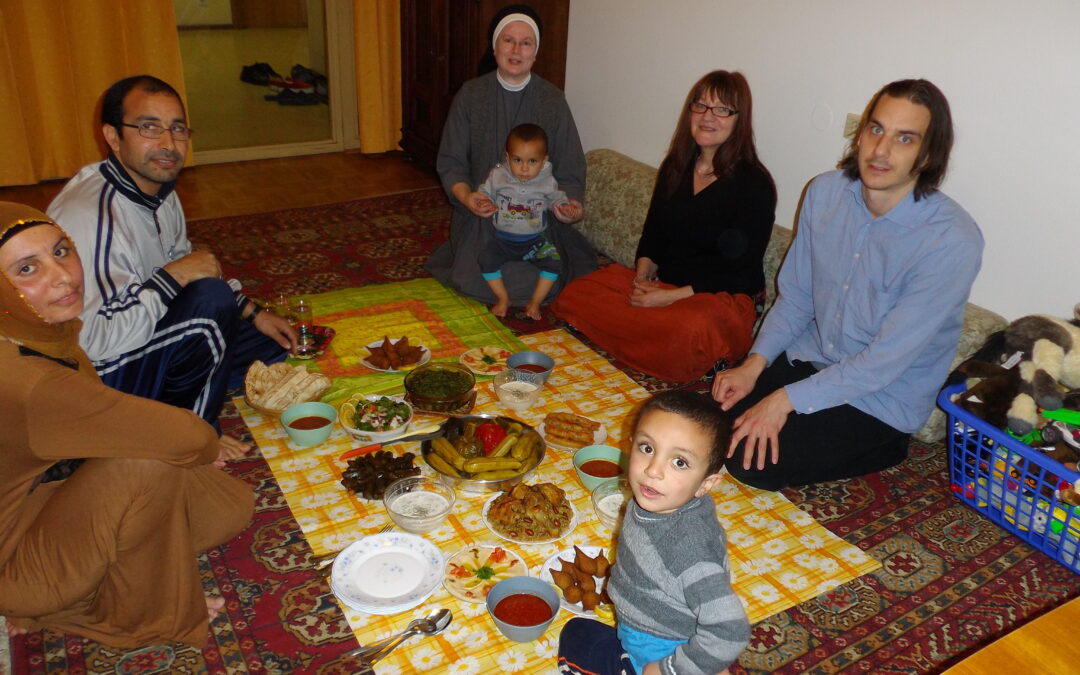
Jun 11, 2016 | Focolare Worldwide
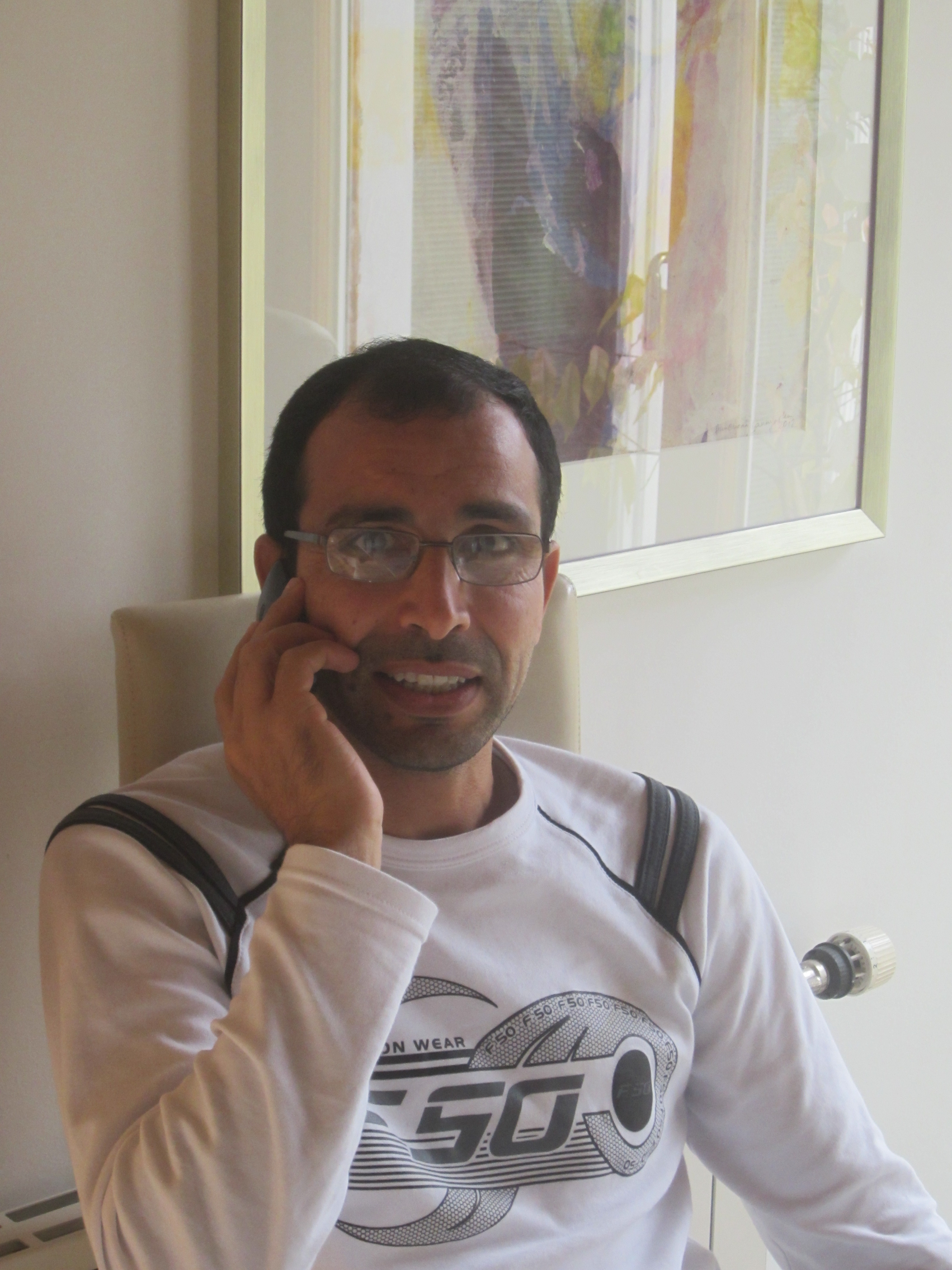 “I had to leave everything behind: my wife, two small children and my country. On the other hand, I didn’t have a choice. Being young and a teacher, I would have had to follow ISIS and spread its ideas. But since I opposed it, if I had remained there they would have murdered me.” When Mohamed reached Graz, Austria, like many other immigrants he was parked in a refugee camp, doing nothing for months and having absolutely no contact with the outside world. “We felt so isolated and depressed,” he recounts, “but then somebody did begin to show an intererst in us.” It was the local Focolare community which, through the mediation of a Syrian friend who had been living in Graz for three years, invited 40 of the Syrian refugees from the camp to to get together at a parish hall. This gave them the opportunity to present their precise needs: to learn the language and find a job. The community got to work and in a short time managed to put together a German lanugage course. Some gave money for books, one woman was able to find 15 bicycles from neighbours, which she had repaired at her own expense for the students that had to travel 10 km to attend the lessons. Others found odd jobs for them fixing up houses and doing gardening work. “We finally had something useful that we could do,” Mohamed whispered with relief. “Finally someone took us by the hand and appreciated us.” A friendship began that only deepened and became more heartfelt. It was only logical to get together, to share meals with one another and also to begin a cultural and religious dialogue. The first step was to attend the mosque together where they met many other people. Once, they were more than 400: “It was a great thing for us,” Mohamed confided. “Finally, we were able to feel like ourselves, there we could forget about what had happened to us and enter into direct contact with God. Sharing this moment with Muslims and Christians together made us feel even closer to one another.”
“I had to leave everything behind: my wife, two small children and my country. On the other hand, I didn’t have a choice. Being young and a teacher, I would have had to follow ISIS and spread its ideas. But since I opposed it, if I had remained there they would have murdered me.” When Mohamed reached Graz, Austria, like many other immigrants he was parked in a refugee camp, doing nothing for months and having absolutely no contact with the outside world. “We felt so isolated and depressed,” he recounts, “but then somebody did begin to show an intererst in us.” It was the local Focolare community which, through the mediation of a Syrian friend who had been living in Graz for three years, invited 40 of the Syrian refugees from the camp to to get together at a parish hall. This gave them the opportunity to present their precise needs: to learn the language and find a job. The community got to work and in a short time managed to put together a German lanugage course. Some gave money for books, one woman was able to find 15 bicycles from neighbours, which she had repaired at her own expense for the students that had to travel 10 km to attend the lessons. Others found odd jobs for them fixing up houses and doing gardening work. “We finally had something useful that we could do,” Mohamed whispered with relief. “Finally someone took us by the hand and appreciated us.” A friendship began that only deepened and became more heartfelt. It was only logical to get together, to share meals with one another and also to begin a cultural and religious dialogue. The first step was to attend the mosque together where they met many other people. Once, they were more than 400: “It was a great thing for us,” Mohamed confided. “Finally, we were able to feel like ourselves, there we could forget about what had happened to us and enter into direct contact with God. Sharing this moment with Muslims and Christians together made us feel even closer to one another.” 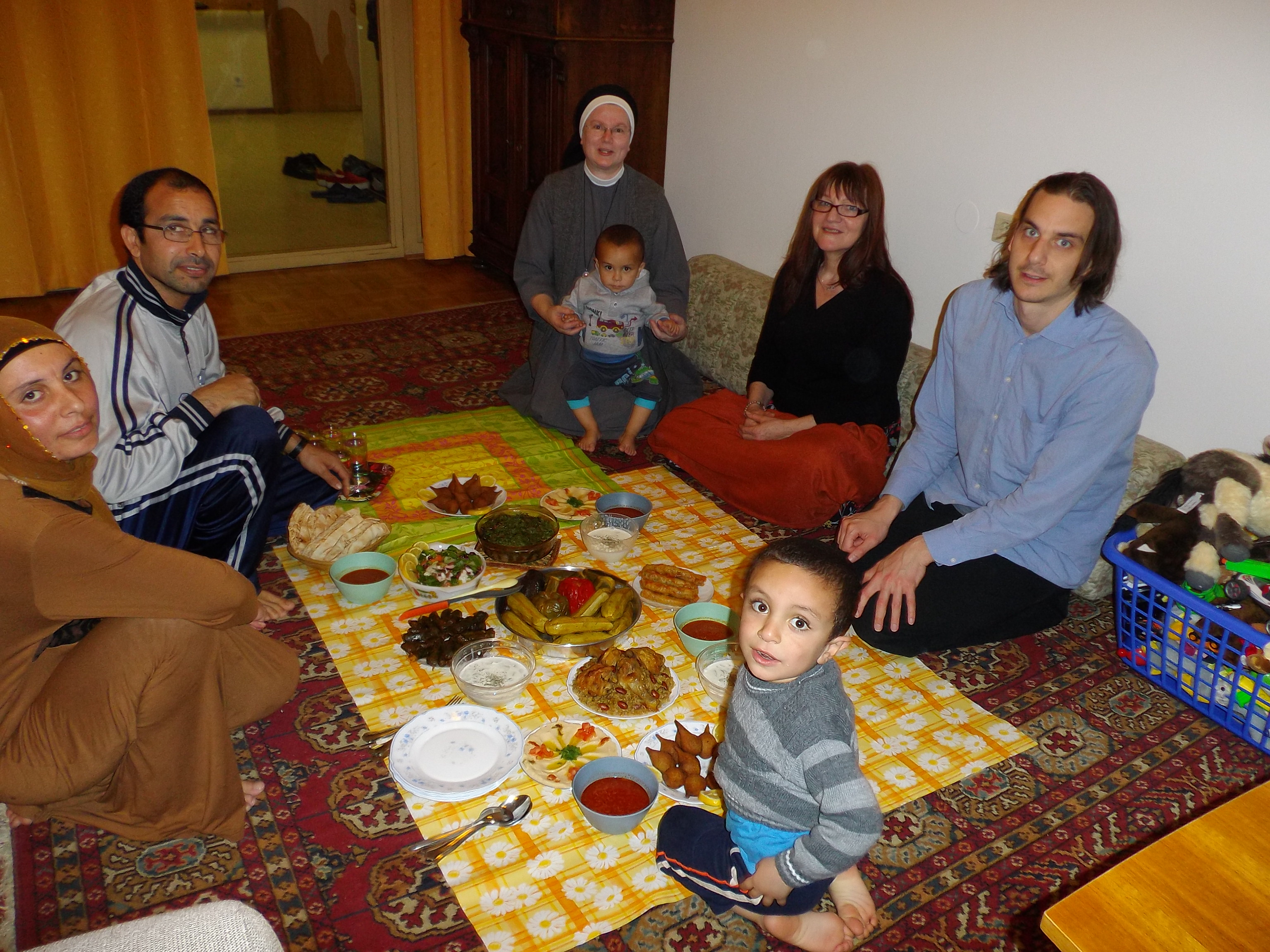 Four Muslims attended the summer Mariapolis, which coincided with the end of Ramadan and was celebrated by all with Arab music, dancing and Syrian sweets. During those days Mohamed learned of his mother’s death. It was a moving occasion to pray together for her and to recite some Psalms that respected everyone’s feelings. Trying to understand another person’s pain is also a form of dialogue. Mohamed then asked the Authorities for permission to reunite with his family in Austria, which turned out to be very complicated. His wife went on foot 22 times for 7 hours amidst cold, hunger and danger to the border – and was promptly sent back. Once she was even locked up in prison. But she finally managed to cross. Thus the long awaited family reunion drew nearer, but it was suggested that they settle in Vienna rather than Graz. Mohamed regretfully left his friends in Graz, unaware of the warm acceptance that would also receive amongst the Focolare community in the capital, which had been notified of his arrival. The community got busy finding a place for the family to live, which was not easy due to the scarcity of housing. They thought of some women religious friends who ran a home for the elderly. In just one day there was already a positive response thanks to a reassuring conversation with the Focolare members. So, now it’s been two months that Mohamed and his family have been living with the Catholic reverend sisters, without any inconvenience for either side: the sisters, acknowledging and respecting the customs of their Muslim guests and the family dwelling in a structure with many prominent Catholic signs. This is also part of dialogue and, as Mohamed declares: “Christians and Muslims, we’re truly brothers and sisters.”
Four Muslims attended the summer Mariapolis, which coincided with the end of Ramadan and was celebrated by all with Arab music, dancing and Syrian sweets. During those days Mohamed learned of his mother’s death. It was a moving occasion to pray together for her and to recite some Psalms that respected everyone’s feelings. Trying to understand another person’s pain is also a form of dialogue. Mohamed then asked the Authorities for permission to reunite with his family in Austria, which turned out to be very complicated. His wife went on foot 22 times for 7 hours amidst cold, hunger and danger to the border – and was promptly sent back. Once she was even locked up in prison. But she finally managed to cross. Thus the long awaited family reunion drew nearer, but it was suggested that they settle in Vienna rather than Graz. Mohamed regretfully left his friends in Graz, unaware of the warm acceptance that would also receive amongst the Focolare community in the capital, which had been notified of his arrival. The community got busy finding a place for the family to live, which was not easy due to the scarcity of housing. They thought of some women religious friends who ran a home for the elderly. In just one day there was already a positive response thanks to a reassuring conversation with the Focolare members. So, now it’s been two months that Mohamed and his family have been living with the Catholic reverend sisters, without any inconvenience for either side: the sisters, acknowledging and respecting the customs of their Muslim guests and the family dwelling in a structure with many prominent Catholic signs. This is also part of dialogue and, as Mohamed declares: “Christians and Muslims, we’re truly brothers and sisters.”
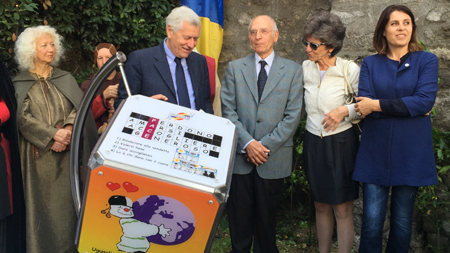
Jun 10, 2016 | Non categorizzato
 On June 4th the Porta della Verità Garden in Viterbo, Italy, was dedicated to Chiara Lubich, to show how her message of unity amongst peoples has been welcomed by the capital city of the Province of Viterbo. It is “a message of interculturalism,” one local newspaper writes in its large coverage of the event, “that when lived out is enriching because of its call for mutual respect of diversity.” The Porta della Verità Garden is a small plot of green just inside the city walls in the historic district of the city of Viterbo. The event was attended by many young students, several costumed characters in a historical parade, as well as city authorities: Mayor Leonardo Michelini and Bishop Lino Fumagalli. The Solidarity Dice project was promoted by the municipal council in 2014 and conceived and carried out by the Christian Associations of Italian Workers (ACLI) in collaboration with the L. Fantappiè Comprehensive Institute. “The idea behind this project was born through a trip to Trieste where saw the Solidarity Dice for the first time. We wanted it in our city because it is a concrete sign of solidarity. It was all achieved thanks to the collaboration from all sectors of the city administration,” explained Renzo Salvatori, president of ACLI in Viterbo. “Solidarity regards all of us,” Bishop Lino Fumagalli emphasized. “You can measure the growth of a society by the number of its works of solidarity. The sentences written on the sides of the dice warm the heart when they are implemented.” Some of the young participants recounted their own daily experiences with solidarity and explained what guided them in coming up with the sentences that were chosen for the Dice of Solidarity through an inter-mural competition with 120 entries. “The Dice of Solidarity is a project that gives meaning to the work of the school that begins inside the classrooms and continues after the final bell,” added Alessandro Ernestino from Fantappiè Institute. “The school is an important part of a community, capable of working on the environment together with the different associations like ACLI and the organizations of the administration. In his concluding remarks Mayor Leonardo Michelini said: “This day is a moment that enters into the history of the city. In the beginning the project didn’t seem to be doable, but the messages that the Dice of Solidarity transmits have universal value.” Sourcee: ViterboPost
On June 4th the Porta della Verità Garden in Viterbo, Italy, was dedicated to Chiara Lubich, to show how her message of unity amongst peoples has been welcomed by the capital city of the Province of Viterbo. It is “a message of interculturalism,” one local newspaper writes in its large coverage of the event, “that when lived out is enriching because of its call for mutual respect of diversity.” The Porta della Verità Garden is a small plot of green just inside the city walls in the historic district of the city of Viterbo. The event was attended by many young students, several costumed characters in a historical parade, as well as city authorities: Mayor Leonardo Michelini and Bishop Lino Fumagalli. The Solidarity Dice project was promoted by the municipal council in 2014 and conceived and carried out by the Christian Associations of Italian Workers (ACLI) in collaboration with the L. Fantappiè Comprehensive Institute. “The idea behind this project was born through a trip to Trieste where saw the Solidarity Dice for the first time. We wanted it in our city because it is a concrete sign of solidarity. It was all achieved thanks to the collaboration from all sectors of the city administration,” explained Renzo Salvatori, president of ACLI in Viterbo. “Solidarity regards all of us,” Bishop Lino Fumagalli emphasized. “You can measure the growth of a society by the number of its works of solidarity. The sentences written on the sides of the dice warm the heart when they are implemented.” Some of the young participants recounted their own daily experiences with solidarity and explained what guided them in coming up with the sentences that were chosen for the Dice of Solidarity through an inter-mural competition with 120 entries. “The Dice of Solidarity is a project that gives meaning to the work of the school that begins inside the classrooms and continues after the final bell,” added Alessandro Ernestino from Fantappiè Institute. “The school is an important part of a community, capable of working on the environment together with the different associations like ACLI and the organizations of the administration. In his concluding remarks Mayor Leonardo Michelini said: “This day is a moment that enters into the history of the city. In the beginning the project didn’t seem to be doable, but the messages that the Dice of Solidarity transmits have universal value.” Sourcee: ViterboPost

Jun 10, 2016 | Non categorizzato
 “Despite all his moving around in the world, his Roman and in some sense Vatican roots, his political patrolling and social outlook, Igino Giordani never really cut the umbilical cord with his own hometown. To grasp how much he had loved his Tivoli, it’s enough to scroll through some of his writings in which he tells of the place, or to read the novel “La città murata” (The Walled City) that’s set in Tivoli. In Memorie di un cristiano ingenuo (Memoirs of a naive Christian), he paints his hometown environment with words that betray this intense relationship and, in a sense, seem to justify his own basic choices as he assigns to them their own Tiburtine character: playful and untameable, courageous and consistent, aggressive at times but motivated by love for God and wisdom. Igino Giordani was born into a family of humble origins. He more than once expressed veneration for his parents, for the dignity with which they lived their daily lives and for the Catholic faith that marked the key stages of life. In Tivoli Giordani grew personally and also intellectually. He certainly didn’t have the opportunities that some other children with fine intelligence could had. In fact, his father geared him in the direction of manual labour as a mason worker. In the meantime, still a boy, he was fascinated by religious ceremonies and the celebration of the Mass even though they were in Latin. The little Giordani began to memorize some parts and, when he was alone even at work, instead of whistling some popular tune he would recite Latin parts of the Mass. Divine Providence made use of Sor Facchini (the contractor they worked for), who realized that Igino was not cut out for the cement bucket and trowel, but for school and book. Sor Facchini decided to finance Igino’s schooling at the Seminary of Tivoli, which at that time was the best place for shaping the intellect and spiritual life of a thirteen year-old boy. He remained there until 1912 when he should have moved to the Seminary of Anagni. But Igino decided to stay in Tivoli and attend classical high school from which he graduated in 1914. It’s likely that the passion for polished and effective argument about the intellectual basis of the Catholic faith was already engraved on Giordani’s life at an early age while listening to Jesuit Father Mancini at Saint Andrew Church in Tivoli. Giordani described the priest as a “compelling and unassailable man of the faith”. He spoke of Mancini as a man if irresistible and unattackable faith. He was a combative spreader of the Gospel; for Giordani he was a true role model. In this first phase of his upbringing we can already foresee several traits that would lead Giordani to assert himself as a debater and defender of the faith. Shortly after his graduation from high school, Italy also entered the War. Igino faced Italian public life that was in the midst of a controversial debate over war and peace, as a resolute pacifist at a time when pacifist ideas were not easy to support. It is likely that thanks to the charismatic figure of Father Mancini, the solid experience of the faith in seminary and the pluralistic political ideology that was breathed in high school, Giordani – who even in those years seemed to have grown tepid from a religious point of view – had never lost the sense of love of neighbour, which led him to dismiss all forms of violence towards all human beings. A few years later he would say so himself with shining simplicity as he expressed his distaste for battle during those years of war: “When I was on watch in the trenches during the First World War thoughts of the divine commandment tortured me: ‘Fifth: Do not kill.” He had been raised in Tivoli where he had been trained in peace. And in a song written by Giordani many years later, steeped in the devastating experience of war but also of faith and hope born from the encounter with the spirituality of unity: Contempt for man and his depreciation derive from the fact that we no longer see Christ in him; and so love is substituted by hatred, which is the spirituality of the prince of death. Alberto Lo Presti See: Igino Giordani, La divina avventura (Rome: Città Nuova, 1993), p. 141.
“Despite all his moving around in the world, his Roman and in some sense Vatican roots, his political patrolling and social outlook, Igino Giordani never really cut the umbilical cord with his own hometown. To grasp how much he had loved his Tivoli, it’s enough to scroll through some of his writings in which he tells of the place, or to read the novel “La città murata” (The Walled City) that’s set in Tivoli. In Memorie di un cristiano ingenuo (Memoirs of a naive Christian), he paints his hometown environment with words that betray this intense relationship and, in a sense, seem to justify his own basic choices as he assigns to them their own Tiburtine character: playful and untameable, courageous and consistent, aggressive at times but motivated by love for God and wisdom. Igino Giordani was born into a family of humble origins. He more than once expressed veneration for his parents, for the dignity with which they lived their daily lives and for the Catholic faith that marked the key stages of life. In Tivoli Giordani grew personally and also intellectually. He certainly didn’t have the opportunities that some other children with fine intelligence could had. In fact, his father geared him in the direction of manual labour as a mason worker. In the meantime, still a boy, he was fascinated by religious ceremonies and the celebration of the Mass even though they were in Latin. The little Giordani began to memorize some parts and, when he was alone even at work, instead of whistling some popular tune he would recite Latin parts of the Mass. Divine Providence made use of Sor Facchini (the contractor they worked for), who realized that Igino was not cut out for the cement bucket and trowel, but for school and book. Sor Facchini decided to finance Igino’s schooling at the Seminary of Tivoli, which at that time was the best place for shaping the intellect and spiritual life of a thirteen year-old boy. He remained there until 1912 when he should have moved to the Seminary of Anagni. But Igino decided to stay in Tivoli and attend classical high school from which he graduated in 1914. It’s likely that the passion for polished and effective argument about the intellectual basis of the Catholic faith was already engraved on Giordani’s life at an early age while listening to Jesuit Father Mancini at Saint Andrew Church in Tivoli. Giordani described the priest as a “compelling and unassailable man of the faith”. He spoke of Mancini as a man if irresistible and unattackable faith. He was a combative spreader of the Gospel; for Giordani he was a true role model. In this first phase of his upbringing we can already foresee several traits that would lead Giordani to assert himself as a debater and defender of the faith. Shortly after his graduation from high school, Italy also entered the War. Igino faced Italian public life that was in the midst of a controversial debate over war and peace, as a resolute pacifist at a time when pacifist ideas were not easy to support. It is likely that thanks to the charismatic figure of Father Mancini, the solid experience of the faith in seminary and the pluralistic political ideology that was breathed in high school, Giordani – who even in those years seemed to have grown tepid from a religious point of view – had never lost the sense of love of neighbour, which led him to dismiss all forms of violence towards all human beings. A few years later he would say so himself with shining simplicity as he expressed his distaste for battle during those years of war: “When I was on watch in the trenches during the First World War thoughts of the divine commandment tortured me: ‘Fifth: Do not kill.” He had been raised in Tivoli where he had been trained in peace. And in a song written by Giordani many years later, steeped in the devastating experience of war but also of faith and hope born from the encounter with the spirituality of unity: Contempt for man and his depreciation derive from the fact that we no longer see Christ in him; and so love is substituted by hatred, which is the spirituality of the prince of death. Alberto Lo Presti See: Igino Giordani, La divina avventura (Rome: Città Nuova, 1993), p. 141.
![Best wishes for Ramadan]()
Jun 9, 2016 | Non categorizzato
 “May glory be upon you my Lord, He who is the Adored One, the One to be adored, the Eternal One, who existed from all times, who loves us, whose Mercy and Power embrace the universe (…). You are the Adored One, Oh Lord, You are the Master who loves and forgives. Your forgiveness and Your mercy are infinite, Oh Lord, You help those who are afflicted, the Consoler in every grief, the Refuge for those whose heart is broken.” (From a prayer by Ali ibn Abi Talib, cousin and son-in-law of the Islamic prophet Muhammad)
“May glory be upon you my Lord, He who is the Adored One, the One to be adored, the Eternal One, who existed from all times, who loves us, whose Mercy and Power embrace the universe (…). You are the Adored One, Oh Lord, You are the Master who loves and forgives. Your forgiveness and Your mercy are infinite, Oh Lord, You help those who are afflicted, the Consoler in every grief, the Refuge for those whose heart is broken.” (From a prayer by Ali ibn Abi Talib, cousin and son-in-law of the Islamic prophet Muhammad)

Jun 9, 2016 | Focolare Worldwide
 The spacious “Knowledge Sharing Centre” Hall of the John Paul II Catholic University of Lublin hosted a Conflicts, Dialogue and Culture of Unity Conference , June 3-4, 2016. The conference was meant to promote the transmission of knowledge through academic dialogue amongst 180 people, including scholars and professors from a variety of academic fields of the social sciences. Ninety five interactive presentations were given that included discussions, questions and answers, as well as requests for sharing research efforts. It was a gift shared amongst different specializations, but also amongst generations and geographic regions of Europe, and it was open to the challenges of the whole world. The conference that opened with Jesús Morán’s presentation titled “The Culture of Unity and the great challenges of humanity today” was motivated by the 20th anniversary of the conferral of the honorary doctorate in Social Sciences to Chiara Lubich, by the Catholic University of Lublin in June 1996. The conferral speech by Professor Adam Biela explained the motivation: The charism of unity “is a concrete and practical actualization of a new vision of social, economic, political, educational structures and of religious relations. It guides, recommends, suggests, teaches and promotes unity” among people. Biela grasped in the revolutionary inspiration of Chiara Lubich that began to manifest itself in the 1940s, the elements of a new paradigm for the social sciences, which led him to coin the unprecedented term: paradigm of unity. The event, 20 years later, in Lublin was “a complex and interesting” meeting, according to Professor Italo Fiorin, president of the graduate school of Formation Science at LUMSA University in Rome, Italy. “. . . especially because of the title, which connects three words: Conflict – reflecting on the not catastrophic but problematic situation of the world that calls for a sense of responsibility. Dialogue: as the path that leads to and changes conflict into something else through positive action. Unity: as the result of a dialogue that is not expressed in reaching a single way of thinking, but of reaching a greater awareness of one’s own identity.” “For 200 to 300 years knowledge has been divided into fields,” says neuro-scientist Catherine Belzung from the University of Tours, France. “But the actual fragmentation prevents progress from being made. The time of interdisciplinary dialogue has arrived. Chiara Lubich’s thought seems to me the paradigm to keep before us when we are interested in interdisciplinary research, because it’s a Trinitarian paradigm: Each field remains distinct, but must have within it the knowledge of the other disciplines in order to be transformed and, in this way, continue the dialogue. I think that the unity and distinction model that is already being proposed in the spiritual field can be very easily transferred to the field of interdisciplinary dialogue.” Professor Marek Rembierz, pedagogue from the University of Silesia, Katowice, Poland, remarked: “It turned out very interesting for me to think on an interdisciplinary plane. And it took quite a change in mentality: modifying the language of science and culture with the language of the heart. It was a source of inspiration for the participants and could also be so for the social life of individuals. Gianvittorio Caprara, full professor of psychology and social neurosciences at Sapienza University in Rome: “Chiara Lubich had some particularly good and fertile intuitions; fertile because they inspired a work, a movement; now they inspire this conference and other research. It’s ongoing reflection that becomes inspiration. One particular discovery for me was the deep significance of the concept of fraternity, precisely in a society like ours that seriously risks not having brothers and sisters anymore. I encourage the Focolare to insist even more on the systematic research of knowledge so that the action can be even more transformative and efficacious.” “With regard to fraternity,” Fiorin says, “Professor Stefano Zamagni worked on a fascinating point in his presentation on the Economy of Communion and even referred it to politics. I believe that such a reading is also applicable to education, to inspire the education and teaching connection and to lead to important educational solutions. It’s a terrain that merits exploring, to which I intend to devote my attention.” The closing session of the conference was entrusted to Professor Biela, Daniela Ropelato, vice-president of Sophia University Institute (IUS) and Renata Simon from the International Focolare Centre in Rocca di Papa, Italy. A thought from Chiara Lubich offered some powerful guidelines to give continuity to the interdisciplinary dialogue that permeated the conference: “In order to welcome [God’s] All within you, you need to be the nothingness of Jesus Forsaken. (. . .) You have to place yourself in front of everyone in a learning position, because you really do have something to learn. And only nothingness gathers all and holds it tightly to itself in unity.” It was an encouragement that was unanimously accepted: to collaborate, with competence, wisdom and an ability to dialogue even on the academic plane.
The spacious “Knowledge Sharing Centre” Hall of the John Paul II Catholic University of Lublin hosted a Conflicts, Dialogue and Culture of Unity Conference , June 3-4, 2016. The conference was meant to promote the transmission of knowledge through academic dialogue amongst 180 people, including scholars and professors from a variety of academic fields of the social sciences. Ninety five interactive presentations were given that included discussions, questions and answers, as well as requests for sharing research efforts. It was a gift shared amongst different specializations, but also amongst generations and geographic regions of Europe, and it was open to the challenges of the whole world. The conference that opened with Jesús Morán’s presentation titled “The Culture of Unity and the great challenges of humanity today” was motivated by the 20th anniversary of the conferral of the honorary doctorate in Social Sciences to Chiara Lubich, by the Catholic University of Lublin in June 1996. The conferral speech by Professor Adam Biela explained the motivation: The charism of unity “is a concrete and practical actualization of a new vision of social, economic, political, educational structures and of religious relations. It guides, recommends, suggests, teaches and promotes unity” among people. Biela grasped in the revolutionary inspiration of Chiara Lubich that began to manifest itself in the 1940s, the elements of a new paradigm for the social sciences, which led him to coin the unprecedented term: paradigm of unity. The event, 20 years later, in Lublin was “a complex and interesting” meeting, according to Professor Italo Fiorin, president of the graduate school of Formation Science at LUMSA University in Rome, Italy. “. . . especially because of the title, which connects three words: Conflict – reflecting on the not catastrophic but problematic situation of the world that calls for a sense of responsibility. Dialogue: as the path that leads to and changes conflict into something else through positive action. Unity: as the result of a dialogue that is not expressed in reaching a single way of thinking, but of reaching a greater awareness of one’s own identity.” “For 200 to 300 years knowledge has been divided into fields,” says neuro-scientist Catherine Belzung from the University of Tours, France. “But the actual fragmentation prevents progress from being made. The time of interdisciplinary dialogue has arrived. Chiara Lubich’s thought seems to me the paradigm to keep before us when we are interested in interdisciplinary research, because it’s a Trinitarian paradigm: Each field remains distinct, but must have within it the knowledge of the other disciplines in order to be transformed and, in this way, continue the dialogue. I think that the unity and distinction model that is already being proposed in the spiritual field can be very easily transferred to the field of interdisciplinary dialogue.” Professor Marek Rembierz, pedagogue from the University of Silesia, Katowice, Poland, remarked: “It turned out very interesting for me to think on an interdisciplinary plane. And it took quite a change in mentality: modifying the language of science and culture with the language of the heart. It was a source of inspiration for the participants and could also be so for the social life of individuals. Gianvittorio Caprara, full professor of psychology and social neurosciences at Sapienza University in Rome: “Chiara Lubich had some particularly good and fertile intuitions; fertile because they inspired a work, a movement; now they inspire this conference and other research. It’s ongoing reflection that becomes inspiration. One particular discovery for me was the deep significance of the concept of fraternity, precisely in a society like ours that seriously risks not having brothers and sisters anymore. I encourage the Focolare to insist even more on the systematic research of knowledge so that the action can be even more transformative and efficacious.” “With regard to fraternity,” Fiorin says, “Professor Stefano Zamagni worked on a fascinating point in his presentation on the Economy of Communion and even referred it to politics. I believe that such a reading is also applicable to education, to inspire the education and teaching connection and to lead to important educational solutions. It’s a terrain that merits exploring, to which I intend to devote my attention.” The closing session of the conference was entrusted to Professor Biela, Daniela Ropelato, vice-president of Sophia University Institute (IUS) and Renata Simon from the International Focolare Centre in Rocca di Papa, Italy. A thought from Chiara Lubich offered some powerful guidelines to give continuity to the interdisciplinary dialogue that permeated the conference: “In order to welcome [God’s] All within you, you need to be the nothingness of Jesus Forsaken. (. . .) You have to place yourself in front of everyone in a learning position, because you really do have something to learn. And only nothingness gathers all and holds it tightly to itself in unity.” It was an encouragement that was unanimously accepted: to collaborate, with competence, wisdom and an ability to dialogue even on the academic plane.
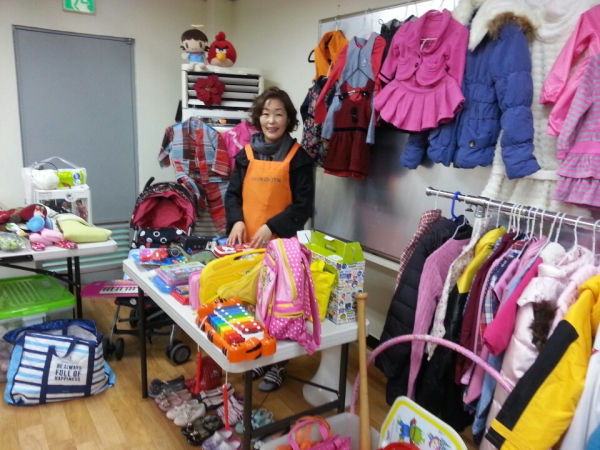
Jun 8, 2016 | Non categorizzato
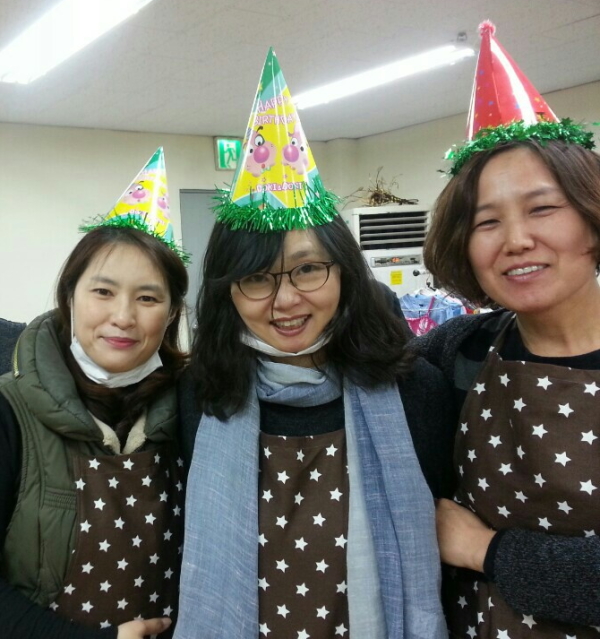 Seongnam, South Korea, more than a million inhabitants on the southeastern outskirts of Seoul, is a growing city with the presence of large companies that further the economic development of the area in a city where there is great wealth alongside abject poverty. “In Korea there is a strong immigration of women from several Asian countries: China, Vietnam, Cambodia, Japan, and more. They come here to marry or to escape from misery. Hence, the many multi-cultural families, most of them living in the poor areas of our city,” explains a Focolare group from Korea who were attending the OnCity international conference in Castelgandolfo, Italy. One of their greatest needs is integration.
Seongnam, South Korea, more than a million inhabitants on the southeastern outskirts of Seoul, is a growing city with the presence of large companies that further the economic development of the area in a city where there is great wealth alongside abject poverty. “In Korea there is a strong immigration of women from several Asian countries: China, Vietnam, Cambodia, Japan, and more. They come here to marry or to escape from misery. Hence, the many multi-cultural families, most of them living in the poor areas of our city,” explains a Focolare group from Korea who were attending the OnCity international conference in Castelgandolfo, Italy. One of their greatest needs is integration. 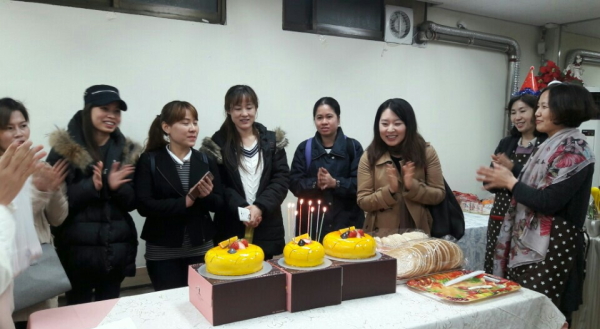 In the Multicultural Centre where some of the Focolare members work, they teach women immigrants to speak Korean, and have proposed establishing some kind of child care programme to entertain the children while their mothers learn the new language. “But at one point the government funding was removed and we couldn’t continue with our activity,” they say. “We told some friends who share our commitment in living ideals of unity and peace in our city. Each one of them gave what they could: time, skills – taking on the problems and situations of many people.” They were faced with truly painful situations: settling in a new country is not easy. For many, the Centre was a place where they could catch their breath, a place where they could share one another’s problems, especially financial problems.
In the Multicultural Centre where some of the Focolare members work, they teach women immigrants to speak Korean, and have proposed establishing some kind of child care programme to entertain the children while their mothers learn the new language. “But at one point the government funding was removed and we couldn’t continue with our activity,” they say. “We told some friends who share our commitment in living ideals of unity and peace in our city. Each one of them gave what they could: time, skills – taking on the problems and situations of many people.” They were faced with truly painful situations: settling in a new country is not easy. For many, the Centre was a place where they could catch their breath, a place where they could share one another’s problems, especially financial problems.  In 2012 we opened a small market where you could buy what you needed at a low cost. We called this small temporary project: The Mary of Nazareth Project. Many people helped us by donating clothing, toys, office supplies and linens.” What could be done with the small sum of around 353 Euros? “We decided to follow the Economy of Communion approach of distributing the profits: 1/3 for a family (a Cambodian family that our community had taken into its care until they could stand on their own); 1/3 to buy any additional things they might need; 1/3 for everyone in the group (to celebrate the birthdays of immigrants who didn’t have families with them). Finally, the Maria Market recived a donation from the government and the Centre decided to remodel the shop. But it was only reopened in 2014 after much expectation. The following year, they received a visit from the Mayor. In June 2015, with the spread of Mers in Korea, 2,900 schools were closed and 4,000 people were placed in isolation. Like many public locations the Centre also had to close. However, during the period of the shut-down, “we visited people in their homes and supported them in the little things. In the end, the Centre gave us a “Thank You” plaque. Now Maria Market is open again and always developing new ideas like mail delivery service for long distance customers. For the group running the project it continues to be “a concrete experience of answering the needs of our neediest sisters and brothers.”
In 2012 we opened a small market where you could buy what you needed at a low cost. We called this small temporary project: The Mary of Nazareth Project. Many people helped us by donating clothing, toys, office supplies and linens.” What could be done with the small sum of around 353 Euros? “We decided to follow the Economy of Communion approach of distributing the profits: 1/3 for a family (a Cambodian family that our community had taken into its care until they could stand on their own); 1/3 to buy any additional things they might need; 1/3 for everyone in the group (to celebrate the birthdays of immigrants who didn’t have families with them). Finally, the Maria Market recived a donation from the government and the Centre decided to remodel the shop. But it was only reopened in 2014 after much expectation. The following year, they received a visit from the Mayor. In June 2015, with the spread of Mers in Korea, 2,900 schools were closed and 4,000 people were placed in isolation. Like many public locations the Centre also had to close. However, during the period of the shut-down, “we visited people in their homes and supported them in the little things. In the end, the Centre gave us a “Thank You” plaque. Now Maria Market is open again and always developing new ideas like mail delivery service for long distance customers. For the group running the project it continues to be “a concrete experience of answering the needs of our neediest sisters and brothers.”
![Best wishes for Ramadan]()
Jun 7, 2016 | Non categorizzato
 The news summary will be made available on the Collegamento CH website a few days before the Internet transmission. On the same website one can find all the previous linkups in various languages, as full editions as well as individual news video clips. https://vimeo.com/170950751
The news summary will be made available on the Collegamento CH website a few days before the Internet transmission. On the same website one can find all the previous linkups in various languages, as full editions as well as individual news video clips. https://vimeo.com/170950751
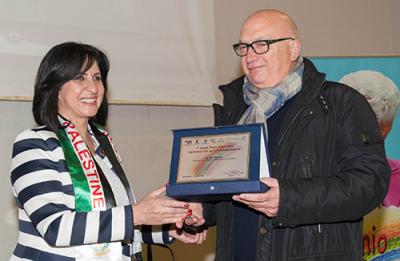
Jun 7, 2016 | Focolare Worldwide
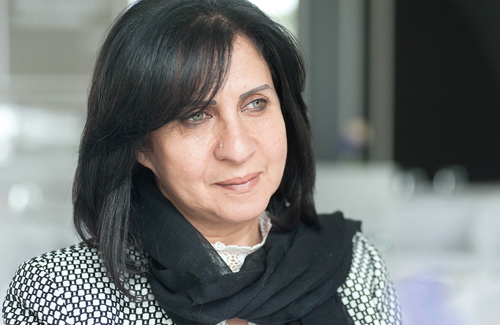 “I met Bella, a Jewish woman, at a Focolare centre in Jerusalem. I had told her the story about my husband in an Israeli jail where he was tortured. She listened to me, although I noted a certain inner conflict. She was in front of a crossroads: whether to be an Israeli and therefore reject everything I was saying, or to feel compassionate toward me. At first she wasn’t able to accept me and went back to the room where we had met. I followed her and told her I was sorry that I had upset her. Bella explained to me that it wasn’t my fault, but that of the system. Then I asked if we could begin again, and she was touched. That’s how our friendship was born. A wall separates my city of Bethlehem from her city of Jerusalem, but there are no longer walls between the two of us. I pray that many Israeli can look at our friendship. Bella lives the spirit of the Focolare in the sense that we’re all children of God, and it’s only love and compassion that leads us to live together with one another. We human beings have built a wall around Bethlehem, but you cannot build anything alone. God gave us the freedom to build it, or to tear it down within us as well.” This is how Vera Baboun, the first Catholic woman mayor of Bethlehem responded to the question of whether it was possible to establish true friendship between Palestinians and Israeli. The occasion of the meeting was the7th Chiara Lubich, Manfredonia City For Universal Brotherhood Award” in March 2016.
“I met Bella, a Jewish woman, at a Focolare centre in Jerusalem. I had told her the story about my husband in an Israeli jail where he was tortured. She listened to me, although I noted a certain inner conflict. She was in front of a crossroads: whether to be an Israeli and therefore reject everything I was saying, or to feel compassionate toward me. At first she wasn’t able to accept me and went back to the room where we had met. I followed her and told her I was sorry that I had upset her. Bella explained to me that it wasn’t my fault, but that of the system. Then I asked if we could begin again, and she was touched. That’s how our friendship was born. A wall separates my city of Bethlehem from her city of Jerusalem, but there are no longer walls between the two of us. I pray that many Israeli can look at our friendship. Bella lives the spirit of the Focolare in the sense that we’re all children of God, and it’s only love and compassion that leads us to live together with one another. We human beings have built a wall around Bethlehem, but you cannot build anything alone. God gave us the freedom to build it, or to tear it down within us as well.” This is how Vera Baboun, the first Catholic woman mayor of Bethlehem responded to the question of whether it was possible to establish true friendship between Palestinians and Israeli. The occasion of the meeting was the7th Chiara Lubich, Manfredonia City For Universal Brotherhood Award” in March 2016.  Bethlehem is a Palestinian city located in the West Bank. It has a population of 40,000 people, of which 28% are Christian and 72% Muslim. It is the city where Jesus was born, some 10 km south of Jerusalem. The Church of the Nativity is one of the oldest churches in the world. Nevertheless, “the wall also conditions our faith, because we were accustomed to visiting the original sites of Jesus’s life from the time we were children. There is a whole generation of young Palestinians that has never prayed at the Holy Sepluchre in Jerusalem,” said Vera Baboun. “We’re the Nativity capital of the world. We celebrate and offer a message of peace to the world, while peace is precisely what is missing in Bethlehem. After the 40% rate of cancellations this year we decided with the City Council to lower taxes on the tourist industry by 80%. We did it to offer them support even though it signifies a depletion of resources for the Municipality. But who supports us? Who supports our dual identity: our universal Christian identity and our Palestinian identity? But what makes you do it? “Only God’s love. I feel it very strongly. I don’t care at all about the power, the fame. Being mayor is a burden for me that costs me much. After the death of my husband and after having worked my whole life in education, I decided to take my husband’s place because he was involved politically in working for the liberation of Palestine.” You have often declared: “Will the world ever be able to live in peace as long as the city of peace is walled up?” “As long as the city of Bethlehem is walled up, there will be a wall around peace. We’re under siege. As for the world, it would be better to work at liberating peace not only for Bethlehem, but for our own sake to free ourselves from the way of evil, from using religion as a mask to cover up evil and war.” Interview byAurelio Molé for Città Nuova (see Città Nuova, No. 5, May 2016)
Bethlehem is a Palestinian city located in the West Bank. It has a population of 40,000 people, of which 28% are Christian and 72% Muslim. It is the city where Jesus was born, some 10 km south of Jerusalem. The Church of the Nativity is one of the oldest churches in the world. Nevertheless, “the wall also conditions our faith, because we were accustomed to visiting the original sites of Jesus’s life from the time we were children. There is a whole generation of young Palestinians that has never prayed at the Holy Sepluchre in Jerusalem,” said Vera Baboun. “We’re the Nativity capital of the world. We celebrate and offer a message of peace to the world, while peace is precisely what is missing in Bethlehem. After the 40% rate of cancellations this year we decided with the City Council to lower taxes on the tourist industry by 80%. We did it to offer them support even though it signifies a depletion of resources for the Municipality. But who supports us? Who supports our dual identity: our universal Christian identity and our Palestinian identity? But what makes you do it? “Only God’s love. I feel it very strongly. I don’t care at all about the power, the fame. Being mayor is a burden for me that costs me much. After the death of my husband and after having worked my whole life in education, I decided to take my husband’s place because he was involved politically in working for the liberation of Palestine.” You have often declared: “Will the world ever be able to live in peace as long as the city of peace is walled up?” “As long as the city of Bethlehem is walled up, there will be a wall around peace. We’re under siege. As for the world, it would be better to work at liberating peace not only for Bethlehem, but for our own sake to free ourselves from the way of evil, from using religion as a mask to cover up evil and war.” Interview byAurelio Molé for Città Nuova (see Città Nuova, No. 5, May 2016)
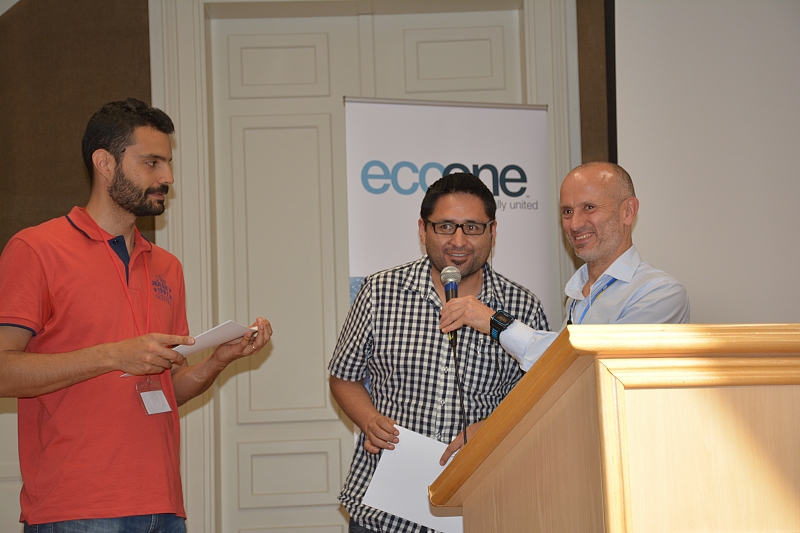
Jun 6, 2016 | Non categorizzato
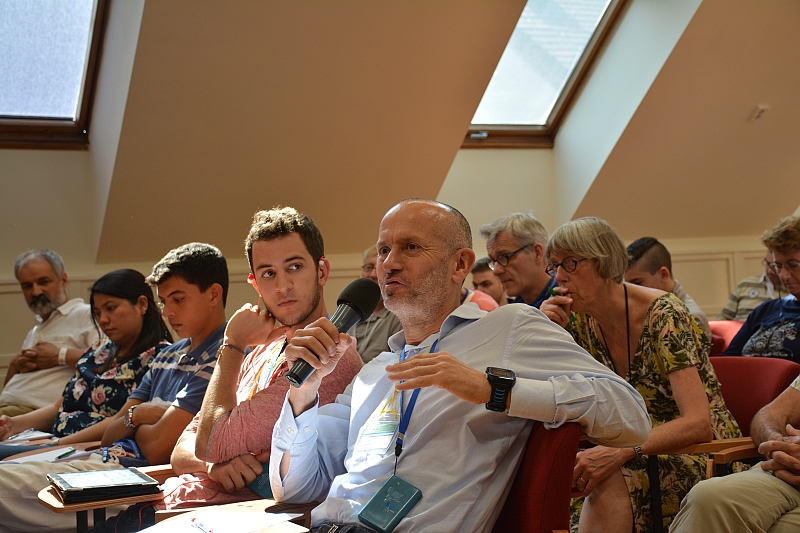 The international coordinator of EcoOne called it “a successful experiment that has addressed a word of hope: A human being who is open to being a gift could in fact be the answer to the epochal environmental challenges that humankind finds itself facing. The meeting was held in Budapest, Hungary from May 27 until May 29 at the Pázmány Péter Catholic University and was attended by 80 representatives of environmental NGOs, university faculty, civil servants, professionals in the field of environment, and high school and university students from different countries. High-level scientific presentations were accompanied by practical experiences and transdisciplinary reflection on fields such as economics and political ethics. There were several presentations: from a 15 year-old boy to an elderly man who is dedicated to caring for the environment in the Focolare town in Holland. Three Italian students presented their experience that straddled energy-saving and the culture of giving. Erasmus, a student in Budapest, a student from Rome and a Brazilian also presented their experiences. The young man from Brazil paid for the trip by making and selling knick-knacks, and receiving a contribution from his university that made an exception in his case.
The international coordinator of EcoOne called it “a successful experiment that has addressed a word of hope: A human being who is open to being a gift could in fact be the answer to the epochal environmental challenges that humankind finds itself facing. The meeting was held in Budapest, Hungary from May 27 until May 29 at the Pázmány Péter Catholic University and was attended by 80 representatives of environmental NGOs, university faculty, civil servants, professionals in the field of environment, and high school and university students from different countries. High-level scientific presentations were accompanied by practical experiences and transdisciplinary reflection on fields such as economics and political ethics. There were several presentations: from a 15 year-old boy to an elderly man who is dedicated to caring for the environment in the Focolare town in Holland. Three Italian students presented their experience that straddled energy-saving and the culture of giving. Erasmus, a student in Budapest, a student from Rome and a Brazilian also presented their experiences. The young man from Brazil paid for the trip by making and selling knick-knacks, and receiving a contribution from his university that made an exception in his case.  Five young researchers received the Piero Pasolini Prize for the quality of their presentations, thanks to the financial support of the Economy of Communion. “Several agencies of the Focolare Movement were involved in the preparation of the event: Action for a United World, Economy of Communion, New Humanity Movement, New Humanity, Young for Unity, Movement Politics & Policy for Unity., Sophia University Institute and an excellent logistical team from the Hungarian EcoOne Group,” Fiorani affirmed. Zsusa Román, the coordinator of EcoOne in Hungary opened the event with a question: “What kind of person does it take to care for the environment?” Fiorani went on to present the features and objectives of EcoOne as: “a cultural initiative at an international level, promoted by experts, researchers and professionals that work in the environmental science sector. We share a common desire to enrich our scientific knowledge with a humanistic approach to ecological and naturalistic problems. With our partners who join us in pursuing a global sharing of the world’s goods and a close interdependence among countries, EcoOne attempts to make such principles flow into society, politics and economy inasmuch as they are also related to the topic of the environment.” Auxiliary Bishop of Esztergom, Hungary, János Székely cited the importance of “sobriety and of the gift” in line with Pope Francis’s Laudato si. A lively debate followed the presentation by Professor Miguel Panão, which focused on a new anthropological notion of the human person as someone in the act of giving himself or herself to others and to nature. The roundtable was particularly appreciated in which the social challenges that are posed by the environment were discussed from a theological, climatological, economic and political point of view, underscoring how much the environmental problem requires the contribution of many disciplines, beginning with politics which guides decisions, and the economy that sets up the models of development. Fiorani concluded saying: “The meeting isn’t an arrival point, but a point of departure. Now we have to prepare for new challenges. The next meeting will be held in Asia!” Info: EcoOne
Five young researchers received the Piero Pasolini Prize for the quality of their presentations, thanks to the financial support of the Economy of Communion. “Several agencies of the Focolare Movement were involved in the preparation of the event: Action for a United World, Economy of Communion, New Humanity Movement, New Humanity, Young for Unity, Movement Politics & Policy for Unity., Sophia University Institute and an excellent logistical team from the Hungarian EcoOne Group,” Fiorani affirmed. Zsusa Román, the coordinator of EcoOne in Hungary opened the event with a question: “What kind of person does it take to care for the environment?” Fiorani went on to present the features and objectives of EcoOne as: “a cultural initiative at an international level, promoted by experts, researchers and professionals that work in the environmental science sector. We share a common desire to enrich our scientific knowledge with a humanistic approach to ecological and naturalistic problems. With our partners who join us in pursuing a global sharing of the world’s goods and a close interdependence among countries, EcoOne attempts to make such principles flow into society, politics and economy inasmuch as they are also related to the topic of the environment.” Auxiliary Bishop of Esztergom, Hungary, János Székely cited the importance of “sobriety and of the gift” in line with Pope Francis’s Laudato si. A lively debate followed the presentation by Professor Miguel Panão, which focused on a new anthropological notion of the human person as someone in the act of giving himself or herself to others and to nature. The roundtable was particularly appreciated in which the social challenges that are posed by the environment were discussed from a theological, climatological, economic and political point of view, underscoring how much the environmental problem requires the contribution of many disciplines, beginning with politics which guides decisions, and the economy that sets up the models of development. Fiorani concluded saying: “The meeting isn’t an arrival point, but a point of departure. Now we have to prepare for new challenges. The next meeting will be held in Asia!” Info: EcoOne
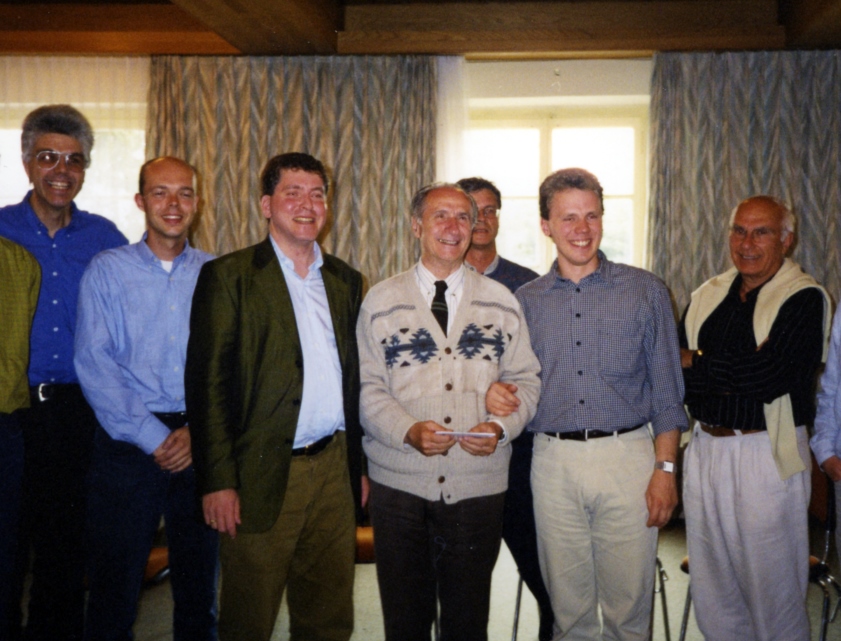
Jun 5, 2016 | Non categorizzato
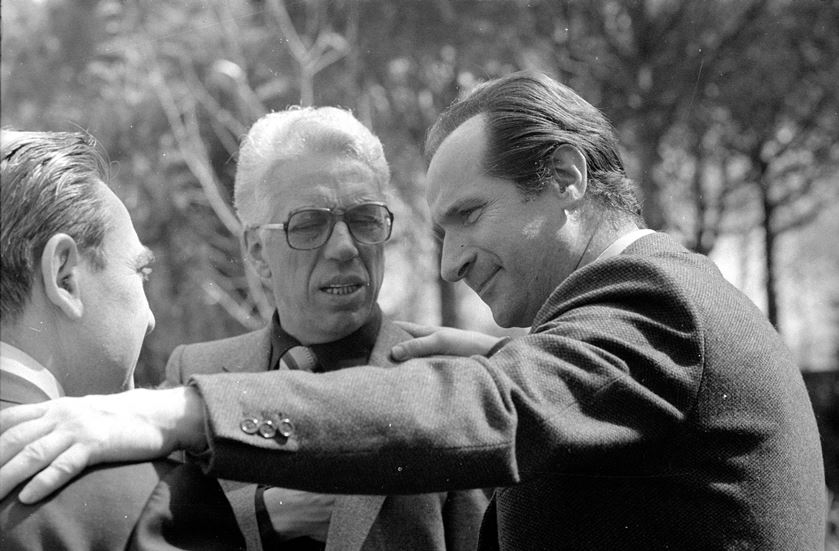
Giorgio Marchetti (right) with Gino Bonadimani and Aldo Stedile. Photo © CSC Audiovisivi
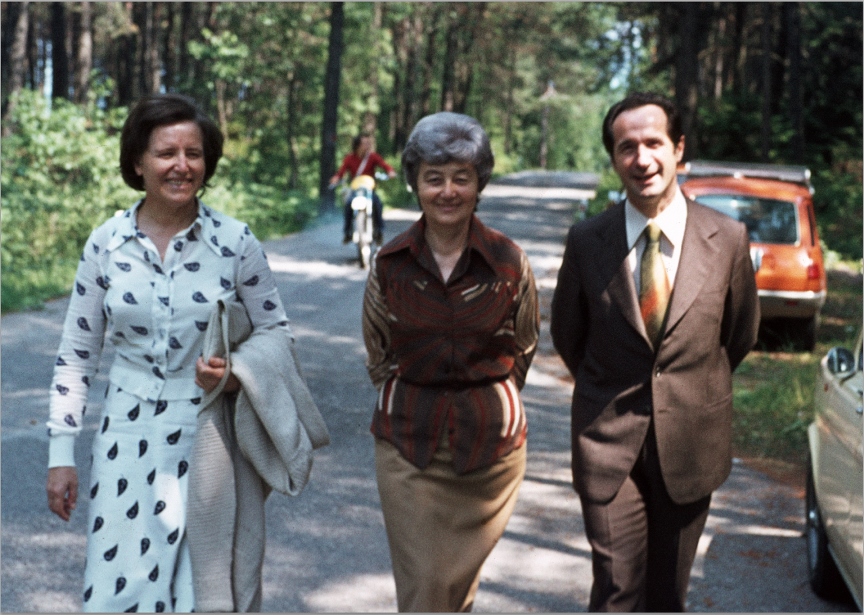
(from left) Valeria Ronchetti, Chiara Lubich and Giorgio Marchetti. Photo © CSC Audiovisivi
 Former head of the Section of the Focolarini from 1957, he returned to that task in 2000, a task that he carried out with dedication. He gave special attention to the married focolarini and the particular nature of their vocation. While strongly dedicated to others, Fede – with his scholarly attitude – did never failed to delve into a variety of disciplines. From 1995 he was a member of the Abba School, the Movement’s Centre for Interdisciplinary Studies where he offered his expertise in the field of ethics, but also philosophy and psychology. In the final years, with his health problems, a period began that Fede loved to describe as “one of the most beautiful periods of my life, so much so that I often find myself saying to Jesus: ‘I never knew that old age could be a beautiful adventure like this!” It was characterized by an “ever deeper and more intimate relationship with Jesus.” When people asked him how he was feeling, he would answer: “physically bad, but spiritually beautiful!” Fede’s legacy is certainly his unbreakable faith in God and in the charism of unity. His legacy is certainly that of a wise and efficacious builder of a work of God – the Focolare Movement, which he helped to develop and to make visible and active in the Church and in the world.
Former head of the Section of the Focolarini from 1957, he returned to that task in 2000, a task that he carried out with dedication. He gave special attention to the married focolarini and the particular nature of their vocation. While strongly dedicated to others, Fede – with his scholarly attitude – did never failed to delve into a variety of disciplines. From 1995 he was a member of the Abba School, the Movement’s Centre for Interdisciplinary Studies where he offered his expertise in the field of ethics, but also philosophy and psychology. In the final years, with his health problems, a period began that Fede loved to describe as “one of the most beautiful periods of my life, so much so that I often find myself saying to Jesus: ‘I never knew that old age could be a beautiful adventure like this!” It was characterized by an “ever deeper and more intimate relationship with Jesus.” When people asked him how he was feeling, he would answer: “physically bad, but spiritually beautiful!” Fede’s legacy is certainly his unbreakable faith in God and in the charism of unity. His legacy is certainly that of a wise and efficacious builder of a work of God – the Focolare Movement, which he helped to develop and to make visible and active in the Church and in the world.

 “I had to leave everything behind: my wife, two small children and my country. On the other hand, I didn’t have a choice. Being young and a teacher, I would have had to follow ISIS and spread its ideas. But since I opposed it, if I had remained there they would have murdered me.” When Mohamed reached Graz, Austria, like many other immigrants he was parked in a refugee camp, doing nothing for months and having absolutely no contact with the outside world. “We felt so isolated and depressed,” he recounts, “but then somebody did begin to show an intererst in us.” It was the local Focolare community which, through the mediation of a Syrian friend who had been living in Graz for three years, invited 40 of the Syrian refugees from the camp to to get together at a parish hall. This gave them the opportunity to present their precise needs: to learn the language and find a job. The community got to work and in a short time managed to put together a German lanugage course. Some gave money for books, one woman was able to find 15 bicycles from neighbours, which she had repaired at her own expense for the students that had to travel 10 km to attend the lessons. Others found odd jobs for them fixing up houses and doing gardening work. “We finally had something useful that we could do,” Mohamed whispered with relief. “Finally someone took us by the hand and appreciated us.” A friendship began that only deepened and became more heartfelt. It was only logical to get together, to share meals with one another and also to begin a cultural and religious dialogue. The first step was to attend the mosque together where they met many other people. Once, they were more than 400: “It was a great thing for us,” Mohamed confided. “Finally, we were able to feel like ourselves, there we could forget about what had happened to us and enter into direct contact with God. Sharing this moment with Muslims and Christians together made us feel even closer to one another.”
“I had to leave everything behind: my wife, two small children and my country. On the other hand, I didn’t have a choice. Being young and a teacher, I would have had to follow ISIS and spread its ideas. But since I opposed it, if I had remained there they would have murdered me.” When Mohamed reached Graz, Austria, like many other immigrants he was parked in a refugee camp, doing nothing for months and having absolutely no contact with the outside world. “We felt so isolated and depressed,” he recounts, “but then somebody did begin to show an intererst in us.” It was the local Focolare community which, through the mediation of a Syrian friend who had been living in Graz for three years, invited 40 of the Syrian refugees from the camp to to get together at a parish hall. This gave them the opportunity to present their precise needs: to learn the language and find a job. The community got to work and in a short time managed to put together a German lanugage course. Some gave money for books, one woman was able to find 15 bicycles from neighbours, which she had repaired at her own expense for the students that had to travel 10 km to attend the lessons. Others found odd jobs for them fixing up houses and doing gardening work. “We finally had something useful that we could do,” Mohamed whispered with relief. “Finally someone took us by the hand and appreciated us.” A friendship began that only deepened and became more heartfelt. It was only logical to get together, to share meals with one another and also to begin a cultural and religious dialogue. The first step was to attend the mosque together where they met many other people. Once, they were more than 400: “It was a great thing for us,” Mohamed confided. “Finally, we were able to feel like ourselves, there we could forget about what had happened to us and enter into direct contact with God. Sharing this moment with Muslims and Christians together made us feel even closer to one another.”  Four Muslims attended the summer Mariapolis, which coincided with the end of Ramadan and was celebrated by all with Arab music, dancing and Syrian sweets. During those days Mohamed learned of his mother’s death. It was a moving occasion to pray together for her and to recite some Psalms that respected everyone’s feelings. Trying to understand another person’s pain is also a form of dialogue. Mohamed then asked the Authorities for permission to reunite with his family in Austria, which turned out to be very complicated. His wife went on foot 22 times for 7 hours amidst cold, hunger and danger to the border – and was promptly sent back. Once she was even locked up in prison. But she finally managed to cross. Thus the long awaited family reunion drew nearer, but it was suggested that they settle in Vienna rather than Graz. Mohamed regretfully left his friends in Graz, unaware of the warm acceptance that would also receive amongst the Focolare community in the capital, which had been notified of his arrival. The community got busy finding a place for the family to live, which was not easy due to the scarcity of housing. They thought of some women religious friends who ran a home for the elderly. In just one day there was already a positive response thanks to a reassuring conversation with the Focolare members. So, now it’s been two months that Mohamed and his family have been living with the Catholic reverend sisters, without any inconvenience for either side: the sisters, acknowledging and respecting the customs of their Muslim guests and the family dwelling in a structure with many prominent Catholic signs. This is also part of dialogue and, as Mohamed declares: “Christians and Muslims, we’re truly brothers and sisters.”
Four Muslims attended the summer Mariapolis, which coincided with the end of Ramadan and was celebrated by all with Arab music, dancing and Syrian sweets. During those days Mohamed learned of his mother’s death. It was a moving occasion to pray together for her and to recite some Psalms that respected everyone’s feelings. Trying to understand another person’s pain is also a form of dialogue. Mohamed then asked the Authorities for permission to reunite with his family in Austria, which turned out to be very complicated. His wife went on foot 22 times for 7 hours amidst cold, hunger and danger to the border – and was promptly sent back. Once she was even locked up in prison. But she finally managed to cross. Thus the long awaited family reunion drew nearer, but it was suggested that they settle in Vienna rather than Graz. Mohamed regretfully left his friends in Graz, unaware of the warm acceptance that would also receive amongst the Focolare community in the capital, which had been notified of his arrival. The community got busy finding a place for the family to live, which was not easy due to the scarcity of housing. They thought of some women religious friends who ran a home for the elderly. In just one day there was already a positive response thanks to a reassuring conversation with the Focolare members. So, now it’s been two months that Mohamed and his family have been living with the Catholic reverend sisters, without any inconvenience for either side: the sisters, acknowledging and respecting the customs of their Muslim guests and the family dwelling in a structure with many prominent Catholic signs. This is also part of dialogue and, as Mohamed declares: “Christians and Muslims, we’re truly brothers and sisters.”


 “May glory be upon you my Lord, He who is the Adored One, the One to be adored, the Eternal One, who existed from all times, who loves us, whose Mercy and Power embrace the universe (…). You are the Adored One, Oh Lord, You are the Master who loves and forgives. Your forgiveness and Your mercy are infinite, Oh Lord, You help those who are afflicted, the Consoler in every grief, the Refuge for those whose heart is broken.” (From a prayer by Ali ibn Abi Talib, cousin and son-in-law of the Islamic prophet Muhammad)
“May glory be upon you my Lord, He who is the Adored One, the One to be adored, the Eternal One, who existed from all times, who loves us, whose Mercy and Power embrace the universe (…). You are the Adored One, Oh Lord, You are the Master who loves and forgives. Your forgiveness and Your mercy are infinite, Oh Lord, You help those who are afflicted, the Consoler in every grief, the Refuge for those whose heart is broken.” (From a prayer by Ali ibn Abi Talib, cousin and son-in-law of the Islamic prophet Muhammad)










